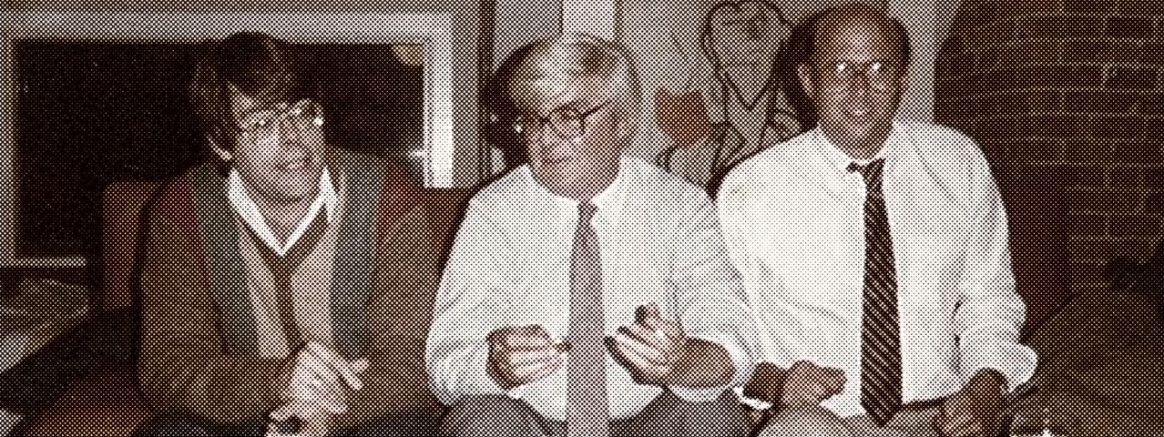
In part one of our exclusive interview with Bill Thompson, the man who discovered Stephen King, we spoke at length on King’s earliest manuscripts and the sale of his debut novel, Carrie.
In part two of our conversation, we will cover the many other Stephen King books Bill Thomspon served as editor on during his time at Doubleday, beginning with 1975’s ‘Salem’s Lot.
JS: When it came to King’s second novel, ’Salem’s Lot, what was your initial reaction upon reading it?
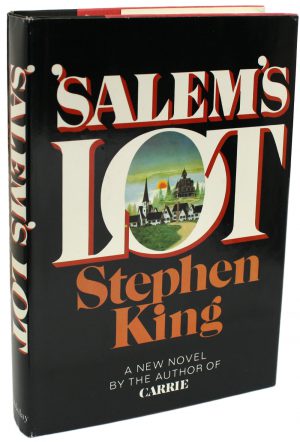
BT: I liked that the town was called Jerusalem’s Lot. I thought, “That’s so perfect. It’s imaginative. It’s colorful. It’s vaguely Biblical.” In fact, the original title was Jerusalem’s Lot, but the sales department said it would sound too much like a religious book, not a vampire story set in a small town. It was Tabby who came up with the idea of putting the apostrophe before the S. She said, “At least people will think of witchcraft now instead of Israel.” That’s how the title happened.
JS: I had heard at one point it was called The Second Coming.
BT: That sounds right. It might have been in early drafts.
JS: Was this another book like Carrie where you felt that it needed a great deal of work in any particular section?
BT: It didn’t need much editing at all. I was a little cooler to it just because it was a vampire story. Vampires were not hot at the time. It seemed like just another strange-man-comes-to-town-and-turns-into-a-vampire story. It was Dracula. There was nothing wrong with it, but it didn’t distinguish itself as something that hadn’t been done before. It was a decent follow up, but it seemed to me just a basic vampire story.
JS: I might have to disagree with you there, though your knowledge of literature is certainly more vast than mine. But I can’t think of anything before 1975 that brought Dracula into suburbia. To bring a vampire story into a small American town where it felt so much more real than the castles of Carfax Abbey, had that been done before ’Salem’s Lot?
BT: It’s a good point. It might have been done before, but not to my knowledge. Certainly not in any book that was popular.
JS: One of our readers had some questions about ‘Salem’s Lot. An early draft of the novel did not include the Prologue, while the famous basement death trap (a board with knives) was originally written as death by rats. Were any of those changes done at your urging?
BT: Adding a Prologue sounds like something I would have recommended. I do remember cutting down on the rats. I don’t remember details, but I’m sure I thought getting eaten by rats was needlessly gross.
JS: Was it the same with The Shining, where you felt that it really didn’t require too much editing?
BT: Oh no, that one required a lot of editing!
JS: It did? How so?
BT: King had a tendency to bring in a second story that had nothing to do with the main story, but offered some kind of subplot that he particularly liked. In the case of The Shining, there was an entire subplot about 20’s and 30’s gangsters. They came and went as ghosts throughout the hotel. He had a whole cast of these characters in The Shining, and it just didn’t belong. I had him trim The Shining back severely.
JS: Wait a minute! Are you telling me there were 20’s and 30’s gangster ghosts in The Shining? I don’t think I’ve ever heard that before. That might be a first, Bill!
BT: Well, REDRUM was a first for me. That was a hard right to the mid-section, when for the first time as a reader you understand the meaning of REDRUM. It was a great story and a wonderful piece of writing.
JS: I read an article the other day that said when you were working on King’s first short story collection, Night Shift, you were adamant that King include only the best of the best stories. How did you select the stories you felt were the best?
BT: I’m sure I expressed my preferences and prejudices about some of the stories, but had he felt strongly about any of them I certainly would have yielded. It was his book, not mine. Of course, I wanted the best; it’s something editors do.
Several short stories which appear in Stephen King’s second short story collection, Skeleton Crew (1985), were originally slated to be collected for Night Shift (1978) according to this letter from Bill Thompson to Stephen King dated April 22, 1977. Photos appear courtesy Bob Jackson.
JS: Do you have a favorite story from Night Shift?
BT: Oh, it’s been so long. I’d have to probably look at a table of contents.
JS: I’ve got it right here. I can throw a few titles at you, if you don’t mind.
BT: Sure! Go right ahead.
JS: “Jerusalem’s Lot,” the previously unpublished prequel to ‘Salem’s Lot.
BT: I remember enjoying that.
JS: “Graveyard Shift,” “Children of the Corn,” “Sometimes They Come Back” –
BT: It’s amazing how many of these stories were turned into movies.
JS: It is! I always loved the story, “The Mangler.”
BT: Not me. I didn’t want King to ever get too bleak in his background to the story. It’s gray. It’s dark. It’s metallic. It’s dirty. I don’t know if he was in a particular mood when he wrote “The Mangler” or not, but that story would not have been one of my favorites.
JS: Is it safe to say that you had more than just a working relationship with King? That you were friends?
BT: Oh yes, certainly.
JS: When did that shift occur?
BT: Well, certainly the paperback sale of Carrie cemented it because it just changed everything for both of us. But really, even just getting to contract after everything we had both been through. I didn’t share the mechanics of it with him because I thought why tell him how impossible it is to make this book happen? Why cry on his shoulder about how frustrating it is from my end? So, he never really knew about my anxiety in getting to the contract stage, but once it happened, that was the turning point. We both really trusted each other after that.
JS: What is your favorite memory of Stephen King?
BT: There really were so many good times together. And when I say that, I don’t mean doing anything wild or partying. He stayed at my apartment in Westchester one night, shortly after we got the contract for Carrie. He still didn’t have any money yet at that point. I had a single bed, which I gave him, and I slept on the couch. I remember thinking, “Hey, I’m giving this guy my bed? What is this here?” But on the other hand, he’s about an inch taller than me, so it made sense. It was a great apartment that had a view of the Hudson. It had a working fireplace. We talked late into the night about books and movies.

Stephen King (left), Bill Thompson (center), and Peter Straub (right) at Straub’s birthday party during the writing of The Talisman (1984).
JS: I’m sure it’s a night he remembers fondly as well.
BT: Oh, this was a night I know he will never forget either because we rode up on the bus with a colleague from Doubleday, who got off a stop before me. I introduced him to Stephen King, and this colleague who had pretentions to be very literate, said to him, “Well when are you going to stop all this and start writing something serious?” King looked at me, and I looked at King. I said to the twerp, “Oh, I think he’s writing serious enough. Do you think the facsimile market you’re in would support another one of your Alger reprints? How’s that doing, by the way?”
I know King never forgot it because for years after that, King would always say, “Do you think this is serious, Bill? Do you think this is a really serious book?” I think it really got to him, this suggestion that he was writing in a category, or that he was just a paperback author.
JS: Was that ever a concern for you?
BT: I told him I didn’t want him to get typed as a horror writer. I wanted him to stretch and do more than that. You have to understand, horror at that time was not a respectable genre. It was not a genre at all, in fact. It was just a sort of elevated comic book. He was really a part of establishing horror as a publishing category. I think at the time it was even lower than science-fiction or fantasy.
JS: Would you say Stephen King is responsible for elevating the genre?
BT: Establishing it, even! It was very soft. What was it other than Frankenstein, Dracula, and Dr. Jekyll and Mr. Hyde?
JS: The Stand is a novel that was famously cut by hundreds of pages at Doubleday’s request. I have read that you were in the process of leaving Doubleday at the time. Were you privy to reading the original uncut incarnation of the novel, and how did you feel about Doubleday cutting so much of it?
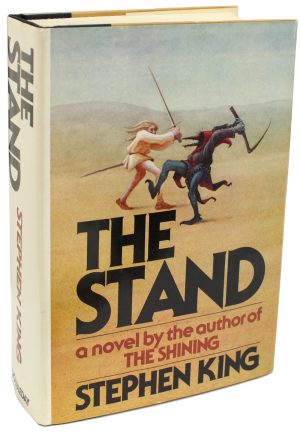
BT: I worked on The Stand as editor, despite my leaving. King had also announced that he was leaving Doubleday, and the understanding was that I would certainly work on The Stand because he wouldn’t work with any other editor. So, I did The Stand. Now, I have two numbers in my head. The first one is 1300, and I can’t believe there were 1300 pages in the original manuscript, but that’s what is in my head. There definitely were 900+ pages in the original manuscript I started working on.
JS: Wow, that’s one big manuscript.
BT: Oh, it was huge. But I’ve always believed that the story belongs to the author. Unless you can really say, “This slows it down,” or “This is a gratuitous scene,” or “You repeat yourself here,” you don’t cut something just for the sake of length.
The problem I was faced with is that Doubleday felt they couldn’t bind the book at the prices they were used to because it was just too big. And if they did spend the extra money to bind it properly, they would have to charge $13.95 or $15.95. They didn’t believe the market would support that kind of price. So, they asked me, “Can you get it down?”
There was enough in that original manuscript that I could make some cuts without feeling any sense of cheating the author. At any rate, he ended up making the majority of the cuts himself. I would flag pages and then discuss it with him. There was nothing arbitrary about this. If he said, “No, I’m going to bleed if you cut that,” then that stayed. This was a joint operation.
It has always been my thought that once New American Library got ahold of it, they made additional cuts. Anytime that you’ve got 12 hours, I’d love for you to go over the New American Library version and the Doubleday version and see if there were any additional cuts made.
JS: Was he amiable about the cuts being made, or was he pretty pissed?
BT: I think he was pretty pissed.
JS: Did you enjoy The Stand?
BT: You have to bear in mind that I was being let go. And I had this doorstop of a manuscript that I was supposed to edit with the same enthusiasm and enjoyment as I’d done the others. I did not get much enjoyment out of it, and I was upset with the ending. I thought if he needed an atomic explosion to tidy up the loose ends, he just ran out of steam. I would have suggested something else, had there been more time to work on it together. It was not a favorite of mine, and I still feel it’s too long.
JS: King’s final book for Doubleday would be Pet Sematary in 1983. Did you have anything to do with editing that?
BT: No, nothing at all.
JS: It is my understanding that it had sat in a drawer for quite a few years before it was ever published. If he had originally brought the novel to you, is it one that you would have passed on like the Bachman books?
BT: Oh no, that one I would have definitely accepted. I might have fussed at him a bit. I would have told him that he’s basically just rewritten “Monkey’s Paw,” which is a classic story, and created an entire novel out of it.
JS: After Doubleday, you began working at Everest House, which in 1981 would publish King’s first foray into non-fiction, Danse Macabre. Is it true that you had to nudge King into doing that book?
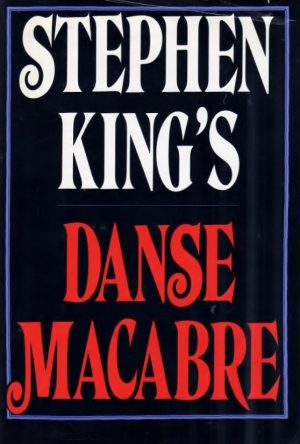
BT: It wasn’t a nudge so much as it was my way to dodge his contract at NAL. They had a contract with him for X number of novels. But if he were to write a cookbook, or a book of poetry, or a book called Danse Macabre, he was free to do so. He and I were still very thick. We were very good friends.
JS: Why did you feel it was so important for him to do this? I heard he was reticent to write it, and you told him: You can, and you should.
BT: Basically, it was the loophole to free him up and supply his good old friend Bill Thompson with a book. (laughs) Bill Thompson was ready to cash in on whatever favor he was owed! I said, “Give me a non-fiction book.” He said he didn’t know what he would write. I said, “You have your favorite movies, books, music… and your fans want to know about it. They’d love to have your voice in their house.” That was how we started talking about it, and it grew into being a book about the history of horror.
JS: Do you have an all-time favorite Stephen King book?
BT: Carrie has to go at the top of this list. That and The Shining. Christine is one of my favorites too, although I didn’t edit that one.
JS: How about the Bachman books?
BT: Well, I did have influence there. He was turning out manuscripts that were just too many for me. It was still the early days and he was going to be outwriting the draw of his fan base. He would be wearing them out before the base got big enough to even absorb them. So, I said, “You’ve got to either slow down, or come up with a pseudonym.” He liked the idea of a pseudonym because that would of course support his belief that if you’re good, you don’t need to get lucky. The readers will find you if it’s quality work. In theory, that’s right, but it doesn’t always work in practice.
Richard Bachman was a very deep and well-kept secret in the publishing industry, and you don’t come by many of those. Publishing is so gossipy. We love to know something on the inside. King did not even tell me, really. We had discussed the possibility, but he never told me he was going to do it or publish those manuscripts as Richard Bachman. But I did tell him over and over, “Don’t overwrite. Don’t flood the market with Stephen King.”
JS: Well, your brain is just amazing, sir. It’s fantastic how much you remember of all these wonderful stories, and I appreciate you sharing them with me. I know you have a web site of your own, BillThompsonEditing.com, and that you make your services available to up and coming writers. How does that process work?
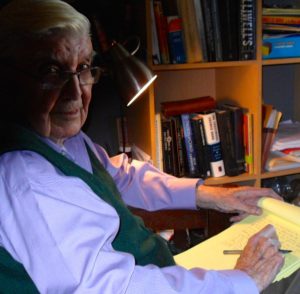
BT: It varies, but usually I ask the writer to send me sample pages first, and I’ll do a short report on that. I’ll send back my comments in the hopes that they will agree and say, “Well how much do you charge to read the rest of the manuscript?” at which point I turn them over to the individual who runs my site and they deal with the business end of things.
JS: Mr. Thompson, if you don’t mind my saying so, you are nothing short of a literary giant. You’re a legend in the world of publishing. The decisions you made had such an impact – not just on publishing and literature, but even upon culture. If you think about the impact Stephen King has made on our culture, the fact that you discovered him changed the course of history. At the time you were discovering names like Stephen King and John Grisham, there was obviously some great talent coming out in the world at that time. Do you find in the new authors who are giving you material to read that there is still just as much talent up and coming in the world as there has always been?
BT: Oh, I think it’s exactly the same. There are as many good writers out there as there ever were. Perhaps more. What I have noticed is how much more difficult it is to get things published. One woman I’ve been working with called today because I’d just done my critique on her book which is mid-range fantasy. I commented on the soft spots that I found and how to fix them. She was calling to let me know that she had made those changes and it was a better book for it. It’s a wonderful novel and despite the fantasy genre having gotten more popular, I can tell you she probably will not get an agent from that, or even get it published – and yet, it is very publishable. Another writer with whom I worked wrote a wonderful piece of commercial fiction. He sent it to 60 agents before even getting a single response. I always responded when I got a manuscript. I don’t think that happens as much anymore. And it’s a shame because the overall quality of writing out there is perhaps even better than it was when King and Grisham were just coming up.
JS: You’ve made so many accomplishments in your career. What is the one of which you are the proudest?
BT: You know, it’s not the accomplishments that I think of. I’m embarrassed to admit this, but what I can’t stop thinking about are the manuscripts that got away. The stories I just couldn’t get support for. Authors who had everything going for them, and I just couldn’t make it work for them, for whatever reason. There’s this one writer from California. I’ve tried to reconstruct his name a hundred times in my memory, and I just can’t think of it. This was a book where King would have been right. He would have found his readers. It was one of the best. I remember the book so vividly and never stopped thinking about it or wishing I could have worked with him. If I could just remember his name, I would be able to reach out and contact him. But then, what good does it do me or him now? I just… (long pause)
I just hope he didn’t give up writing.
Next month: I’ll be on my honeymoon in December, but Keys to the Kingdom will return in January. We’ll be talking with Stu Tinker, friend of the King family and the owner of Bangor’s famous Stephen King Tours. Happy holidays, and see you next year!


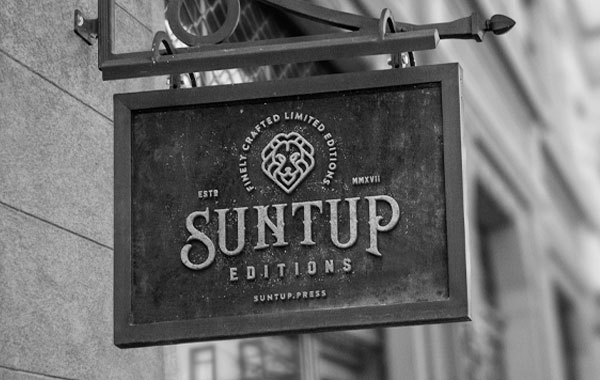


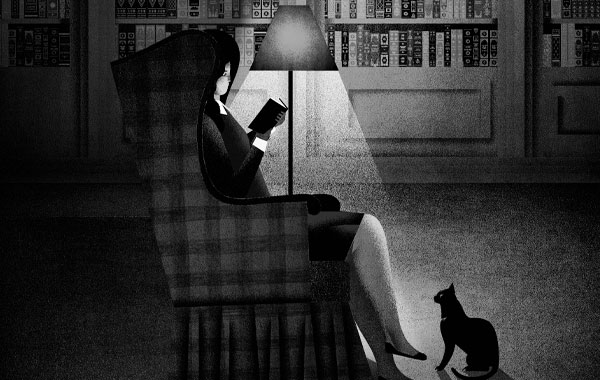




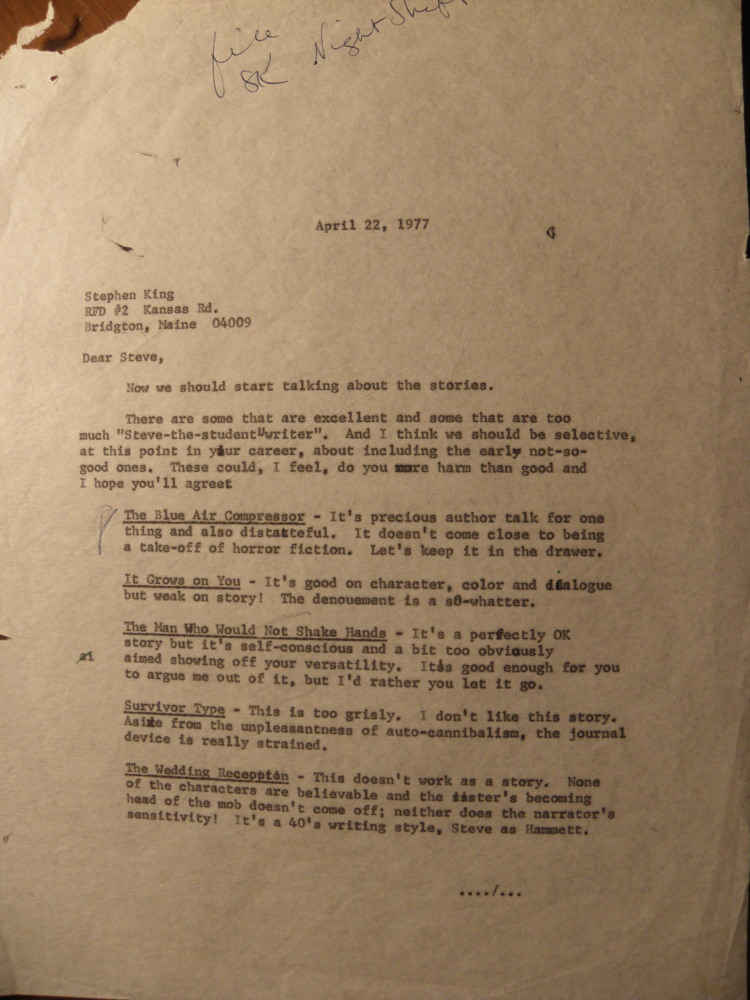
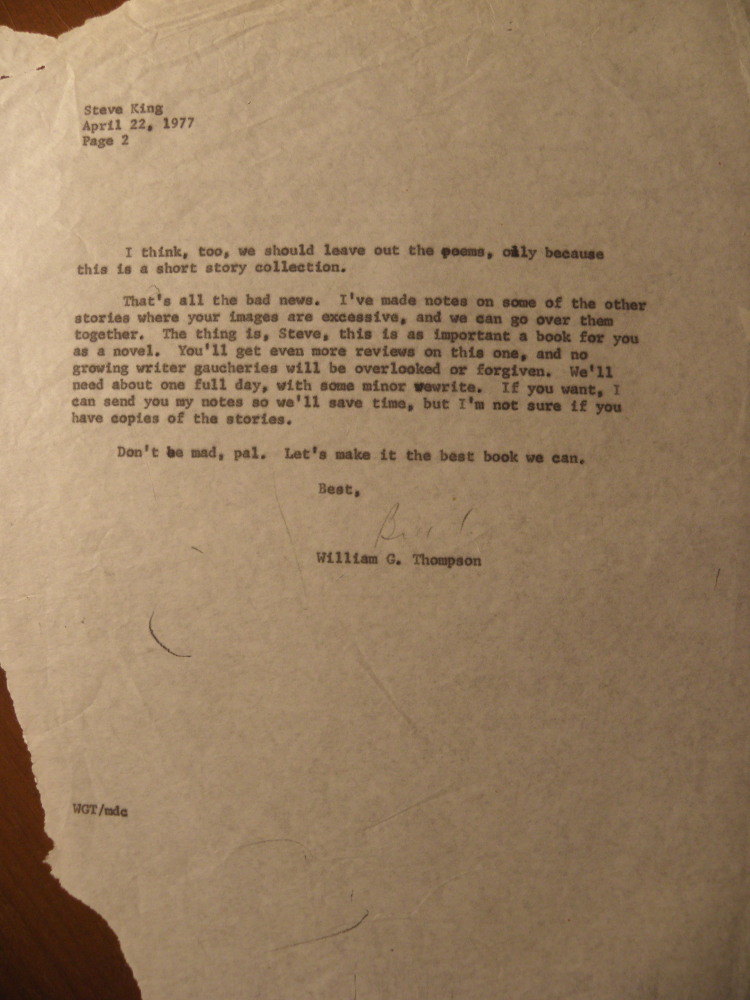
Joe Manning
Great insight and fantastic details made the interview another asset to the Suntup canon.
Jason Sechrest
Thanks Joe! And thank you Suntup Editions for allowing me the opportunity, and lending a platform for having these incredible stories heard.
Club Stephen King
Thanks Jason for that interview. It was a real gem to read, very interesting and insightful.
Enjoy your honeymoon and see your next year Jason
Jason Sechrest
Thank you, Club Stephen King, as always for your support.
Ariel Bosi
Amazing interview, Jason! Congrats! And please send my congratulations to Bill! I enjoyed this A LOT.
Jason Sechrest
Will do, Ariel! Thanks for reading!
michael doukas
Great interview. Very informative on the early years.
Jason Sechrest
Thanks Michael!
Jan Oaks
I really didn’t think I would read this, but I absolutely adore and absorb as much as possible on Stephen King and this interview just added a little more intimacy to my knowledge, which is, admittedly, very little. I’m now buying most books about interviews with King and enjoyed this tremendously. Shared through Stephen King Central site. Thank you for a great interview!
Jason Sechrest
Lovely! Glad to hear it, Jan.
Bryant Burnette
If there were a list of essential interviews about King’s work, I’m positive this two-part one with Bill Thompson would belong on it.
Great work! Many thanks for doing it.
Craig Heller
It’s just so amazing how this whole world of Stephen King and what he has given to us over the many years started so simply and innocently and yet has provided so much time for us to go off into our times of reading his books, anticipating his next release and knowing what enjoyment lies in our future with those times coming.
Lou Sytsma
Another wonderful interview Jason! Thanks – what a treasure to find out new King info after all this time about his earlier works.
’20s and ’30s Gangster Ghosts in The Shining!?! Oh my!
Joel Quinn
Hi Jason and all at Suntup, I’m just catching up on some of the old Suntup posts, hence my late reply. Thank you for this insightful two part interview, hearing Bill Thompson speak of those early days is inspiring. I also love his honesty regarding his personal feelings toward the books, it’s refreshing to hear new takes on them. Keep up the great work guys. Thanks again.